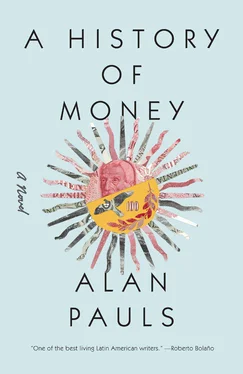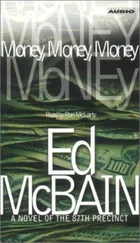He never gets to see this postcard, which like so many things is mislaid and then lost, or perhaps destroyed by his grandmother in a fit of spite, or maybe she takes it out of circulation and keeps it locked in some secret place so that, when everyone is asleep and the neighborhood is as calm as it was the day her husband left her, she can worship it in silence, with the tortured loyalty of a victim opening a secret altar to worship the tragedy that still sets her hopeless life alight. He never sees it, but he knows it perfectly from descriptions; not so much those he gets from his mother, who returns to the subject frequently, as if the famous postcard had cast the mold for all the later disasters, starting with her own divorce, but rather from his father, who’s the first to mention it to him, and in the bitterest terms, and who thirty years later can evoke in lush detail the perfect beach day that shines on one side of the card, and remember precisely how many palm trees there are in each row, and how many sunbathers, and what colors their bathing suits are, how many floors have already been built in the apartment block growing across the promenade, how many clouds you can see, and how much the postmark says it cost to send this card from Torremolinos to Buenos Aires in 1956.
In fact, he comes across it thirty years later in a secondhand bookshop in the center of the city. He’s been there for a while, getting his fingers mucky on the dusty spines of the books — perhaps the only objects capable of collecting more dirt than money. He’s not looking for anything in particular, and this lack of purpose aggravates his disappointment in all these little books of poems, scrawny vanity publications, and colossal, idiotic novels with garish covers that nobody will ever buy, not him nor anybody else. Not holding out much hope, simply to entertain himself a little, he moves to the table opposite, which holds a series of large cardboard boxes containing a jumble of period newspapers, old magazines in plastic sheaths, film stills, sheets of stamps, and postcards. And while he looks at his blackened fingertips, which the layers of dust seem to have hardened, the bookseller, a burly asthmatic in ancient suspenders who’s been walking around the shop putting more stock on the tables, stops beside him for a moment and drops a transparent envelope full of old postcards into the box his hands are sunk in. On top of the pile, balancing on one corner and staring straight at him, is the postcard of the beach in Torremolinos. He takes the envelope out of the box and shows it to the bookseller. He wants to buy it. The lot’s being sold whole, or not at all. He asks how much and listens incredulously: it costs a hundred and twenty times what his fugitive grandfather paid to send the original postcard. He’s willing to buy it even so, but when he puts his hand in his pocket, he realizes that he’s not carrying that much money on him. He passes the envelope containing the postcards to the bookseller and asks him to put it aside, so that nobody can come along while he’s gone and take a liking to it, and goes in search of an ATM. The closest one is out of service; there’s a line at the second one; the third has run out of money. He wanders around for another fifteen minutes before coming up with the cash. By the time he gets back, the bookstore has closed. He rests his forehead on the glass, makes a visor with his hands, and spots the envelope on top of the cardboard box, lying with an air of disdainful superiority on an old copy of a political weekly — from back when the early years of the seventies were flying, or rather shooting, by — on whose cover a ’73-model yacht designed by the Martinoli shipyard is being blown to pieces by twenty kilos of trotyl, while a police chief suspected of torturing political prisoners waits on board, ready to set off on his weekly outing to Tigre. The cyan blue of the Torremolinos sky dazzles even through the triple filter of the transparent envelope, the dirty glass of the shop’s door, and the iron shutter-curtain. But the farther he gets from the bookstore, the hazier the details of the photo become. The half moon of the beach trembles and evaporates like a landscape seen in passing from a distance, and the colors of the bathing suits start to fade. How can he be sure that it was the one, that it was the postcard? His grandfather and his father, the only people who could confirm it, are dead. He never goes back to that bookshop.
No bank account; checks are unthinkable; pension, taxes — his father isn’t made for all that. He has married and divorced, had cars and apartments, renewed his ID card, signed rental contracts, worked for companies, and signed business letters on letterhead. But he keeps his money in rolled-up socks and only applies for his tax ID number when he’s over seventy-five years old, and even then reluctantly, after doing everything in his power to avoid it, before finally being convinced by a neighbor who lives two floors above him and offers to help him with the paperwork. He’s a classic misfit, the type his father would blindly follow anywhere: he has only a few teeth left, calls himself a public accountant, and wanders around the block in old sweatpants, dragging along a pair of plastic sandals. He’s a fanatical supporter of San Lorenzo, like his father, and an expert in numbers by vocation too, but he’s also sufficiently artful with shady numbers to understand a basic principle that his father will never understand: that nobody can dedicate themselves to such numbers and give nothing to the law in exchange, and that the tax ID number is the most innocuous nothing that can be given. But when the accountant tells his father that the number has finally arrived, he doesn’t go outside, bathe, or answer the phone for three days; he lies sprawled on his TV chair with his back turned to the machine, so depressed by the magnitude of his own lack of principle that he doesn’t even have the energy to press the ON button on the remote. And nevertheless, when they find the lover of crostini dead at the bottom of the river, horribly swollen by the more than three days he’s spent in the water, and without the attaché case that reportedly contains the bundle of dollars everyone wants to know about, the only person to bring up the subject of the money and, after performing some mental magic, estimate how much has been lost or stolen — whether from the bottom of the river when the helicopter is found or earlier, sometime between takeoff and the crash, nobody knows — is his father, his crackpot father, who never saw the dead man in person. As far as he knows, nobody in his stepfamily mentions it, though they’re so closely linked to the dead man by friendship, by business, and by class interests that it’s difficult to imagine them not knowing what role he played in the powder keg in Villa Constitución, what mission he was on when he boarded the helicopter that morning, and also, of course, how much money he had been given to achieve it.
But someone, one of them, must know something. Know, even though they won’t tell — because, as he hears said more than once in the mansion in Mar del Plata, only those who don’t have money talk about it: those who had it once and lost it, and those who made it through unpleasant means, which is to say those who made it at all, rather than inheriting it. Maybe the widow doesn’t have much to say; she might have been kept in the dark by the logic of secrecy and the parallel worlds surrounding militant leaders’ immediate families and the intimate circles of prominent businessmen at the time, ordinary people, wives, husbands, children, siblings, who find out who they’ve been sharing their homes with, their beds, their plans, their vacations, only when someone calls them and asks them to come to the morgue and identify the bodies. And meanwhile this same logic is beginning to rule everything, the specific and the general, the life of companies like the one that employed the dead man for so long and life throughout the whole country, with its Martinoli yachts flying through the air, its industrial belts in flames, and its cross-eyed economy, which has forked into one laughable official dimension, with an anemic, purportedly ruling currency, and another, the so-called black one, where the virus of the dollar releases its toxic fumes.
Читать дальше












